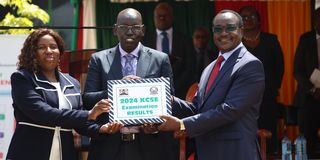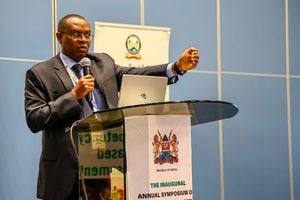
Higher Education PS Beatrice Inyangala (left), Education PS Belio Kipsang (centre) and Education CS Julius Ogamba during the release of the 2024 KCSE results at Mitihani House in Nairobi on January 9, 2025.
The new Cabinet Secretary for Education, Julius Migos Ogamba, released the much-awaited Kenya Certificate of Secondary Education (KCSE) results on Thursday.
This being his first result since he took office after the Gen-Z uprisings sent packing his predecessor, Ezekiel Machogu, the CS should be congratulated on this monumental achievement.
He has delivered the result within a reasonable time frame, notwithstanding the well-documented disruptions to the education calendar in the period just preceding commencement of the examinations.
This result has many positive attributes which should be celebrated by the candidates, parents, teachers and other education stakeholders. The most eye-catching development is that out of the total number of 965,501 candidates, only 840 are suspected to have been involved in examination irregularities, representing an infinitesimal proportion 0.087 per cent.
Even more satisfying in this regard is that these cases of examination irregularities are widely spread across the country, dispelling the previous suspicions that there were specific cheating hotspots in the country.
This fact goes a long way to place a seal of confidence in the examination result. Further, the number of candidates who obtained an overall grade of C (plus) and above increased by 45,258, from 201,133.in 2023 to 246,391 in 2024. Put another way, 25.5 percent of the 2024 KCSE candidates will be eligible for government funding if they opt to join any of the 35 public universities.
This gives the CS additional headache with regard to the funding model given that the 2023 cohort is still waiting on the queue with a similar unresolved issue.
The number of candidates who scored C (minus) and above, and are therefore, eligible for TVET Diploma courses increased by 75,673 from 401,216 in 2023 to 476,889 in 2024. There are many other statistics in this 2024 KCSE whose policy implications may not be obvious.
For instance, the result reveals that female candidates recorded better mean score than their male counterparts in Kiswahili, Kenyan Sign Language, French, Home Science, CRE and Art and Design.
While it is commendable that female candidates recorded improved performance in the aforementioned subjects, they evidently trailed their male colleagues in Mathematics and science subjects such as Physics, Chemistry and Biology. This not only reinforces the stereotype that girls are not wired for the “hard” subjects, but it also denies them opportunities to join lucrative and high-paying careers in Science, Technology, Engineering and Mathematics (STEM), which have traditionally been a preserve of men.
Income inequalities
The implication is that the Kenyan education system is inadvertently perpetuating income inequalities between men and women. Another interesting revelation by CS Ogamba is that the 2024 KCSE result, just like that of the previous year, was graded using a reviewed system, which is more relaxed than the previous one.
Only three factors were considered in determining the overall grade for 2024 KCSE: Mathematics; the best performed language among English, Kiswahili and Kenyan Sign Language; and the best performed five subjects.
It is this new grading system that is responsible for the spike in the number of candidates qualifying for direct university entry. In my opinion, it is a wonderful thing to rationalise subject clusters so that candidates are not bogged down by subjects that are not likely to form part of their preferred careers.
Before this new grading system was introduced, the overall KCSE grade was determined using clusters of Mathematics, science subjects, languages, humanities and social sciences, and vocational subjects. Although that previous grading approach ensured that the education system produced an all-rounded learner with strong analytical skills, it was particularly harsh to the arts-oriented students whose good grades in humanities were weighted down by poor scores in science subjects.
By relaxing the grading requirements, it is now much easier for arts students to bypass science subjects and still obtain high overall grades, something that had proven to be a challenge in the previous grading system.
The improved performance in the 2024 KCSE results that Kenyans are celebrating are therefore, an indication that candidates are now able to obtain better results which are reflective of their preferences and abilities.
Whereas it is important for candidates to be given the latitude to pick subjects that reflect their interests and abilities, it must not be lost on education stakeholders that Kenya is positioning itself for industrial take-off as articulated in the Vision 2030.
Social sciences
The country must therefore, not engage the reverse gear towards more emphasis on humanities and social sciences. One hopes that the curriculum for science-based courses will not be watered down to enable more students to pass KCSE.
The experiences of India, China, Singapore, South Korea and the Asian Tigers that have recently burst on to the stage of industrialisation point to education systems that were deliberately designed to produce human capital with the requisite training to effectively catalyse development endeavours.
Evidently, Kenya has yet to settle on the right educational ingredients required for industrial take-off. The Kenyan education system has for a long time been examination-centered, and not necessarily focused on incremental or prior learning.
is why the country is celebrating A’s and B’s without caring what happens to the Ds and Es. Until Kenya is able to create an educational pathway for the D’s and E’s, and facilitate them to achieve their career dreams, and change their lives for the better, education will not be meaningful to them.
Hopefully, the newly introduced CBC system will be fine-tuned to fix the flaws of the previous system. An education system that excels at producing more D’s and E’s than A’s and B’s is certainly not well prepared to effectively address the pertinent human development requirements of the society.
An education system like Kenya’s that fails almost 70 per cent of its candidates is more of a death sentence than a human capital development strategy. To improve the Kenyan education system, and make it more relevant to the learners and society, the government should consider the following strategies.
STEM subjects
Be deliberate in increasing investment in STEM subjects by improving teachers’ skills and attitudes, resourcing libraries, laboratories and targeting learners’ mindset change to embrace sciences;
Create simulation laboratories to help learners relate classroom work with real life;
Develop a viable framework for financing TVET institutions, including seamless transition of students to technical universities;
Provide opportunities for bridging courses, similar to pre-requisites offered by community colleges in the US and other countries, which facilitate students to pursue courses of their choice;
University entry requirements should be harmonised with high school subject combinations so as to avoid situations where students have high overall grades but lack subject combinations for their preferred courses.
Prof Ongore teaches at the Technical University of Kenya. vincent.ongore@tukenya.ac.ke








